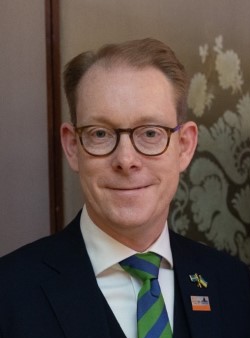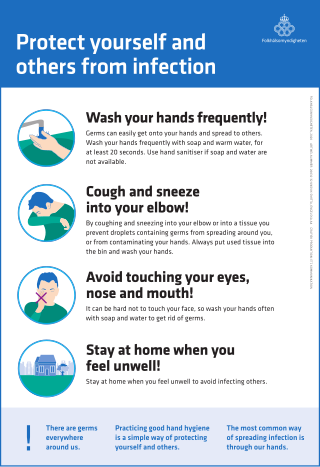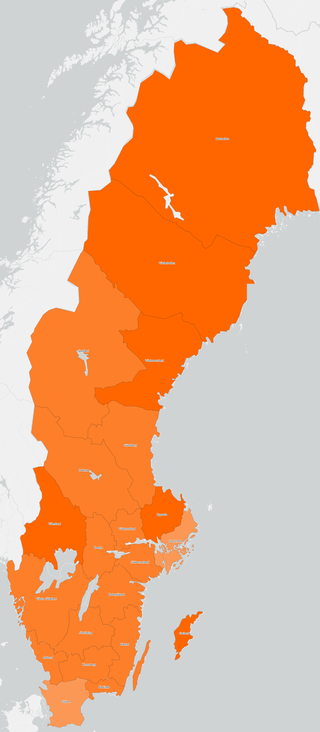
The prime ministerof Sweden is the head of government of the Kingdom of Sweden. The prime minister and their cabinet exercise executive authority in the Kingdom of Sweden and are subject to the Parliament of Sweden. The prime minister is nominated by the speaker of the Riksdag and is elected by the chamber by simple majority, using negative parliamentarianism. The Riksdag holds elections every four years, in the even year between leap years.
A national security council (NSC) is usually an executive branch governmental body responsible for coordinating policy on national security issues and advising chief executives on matters related to national security. An NSC is often headed by a national security advisor and staffed with senior-level officials from military, diplomatic, intelligence, law enforcement and other governmental bodies. The functions and responsibilities of an NSC at the strategic state level are different from those of the United Nations Security Council, which is more of a diplomatic forum.

The Swedish International Development Cooperation Agency is a government agency of the Swedish Ministry for Foreign Affairs. Sida is responsible for organization of the bulk of Sweden's official development assistance to developing countries. According to the OECD, 2022 official development assistance from Sweden increased to US$5.5 billion, representing 0.9% of their Gross National Income (GNI).

Leif Pagrotsky is a Swedish politician, economist, and diplomat. He served as Minister of Culture from 2004 to 2006 and Minister for Business and Industry from 2002 to 2004 under Prime Minister Göran Persson. After this, he held the position of Consul General of Sweden in New York City from 2016 to 2018.

The National Defence Radio Establishment is a Swedish government agency organised under the Ministry of Defence. The two main tasks of FRA are signals intelligence (SIGINT), and support to government authorities and state-owned companies regarding computer security.

Ulf Hjalmar Kristersson is a Swedish politician who has been serving as Prime Minister of Sweden since 2022. He has been the leader of the Moderate Party (M) since October 2017 and a member of the Riksdag (MP) for Södermanland County since 2014 and for Stockholm County from 1991 to 2000. He previously served as Minister for Social Security from 2010 to 2014 and as Chairman of the Moderate Youth League from 1988 to 1992.

Tobias Lennart Billström is a Swedish politician of the Moderate Party. He has most recently served as Minister for Foreign Affairs in the cabinet of Ulf Kristersson and has been Member of the Riksdag since the 2002 general election, representing Malmö Municipality (2002–2022) and Stockholm County.

The Ministry of Justice is a ministry in the Government of Sweden responsible for policies related to combating terrorism, democracy and human rights, family law, the judicial system, migration and asylum and the Constitution of Sweden.

The Ministry of Health and Social Affairs is a ministry in the Government of Sweden responsible for policies related to social welfare: social security, social services, medical and health care, public health and the rights of children, the elderly and disabled people.
Vulnerable area is a term applied by the Swedish Police Authority to areas with high crime rates and social exclusion. They are colloquially known as no-go zones. In the December 2015 report, there were 53 vulnerable areas, which increased to 61 in June 2017. The increase is reported to be due to better reporting, not a changing situation. The overall trend is that these areas are improving.

The second cabinet of Stefan Löfven was the government of Sweden from 21 January 2019 to 9 July 2021. It was a coalition, consisting of two parties: the Social Democrats and the Green Party. The cabinet was installed on 21 January 2019, following the 2018 general election.

The Ministry of Infrastructure, was a ministry within the Government of Sweden. It operated between 2019 and 2022.

Sweden's unique response to the COVID-19 pandemic has been the subject of significant controversy in both domestic and international circles. Unlike most countries, which strongly recommended or introduced widespread sector closures, quarantining, and lockdown measures to curb the spread of the coronavirus disease 2019, the government of Sweden took a more lenient approach to the pandemic, prioritizing the economy and only pursuing social distancing measures such as bans on large gatherings and limited travel restrictions.

Vaccination against COVID-19 in Sweden started on 27 December 2020 after the approval of the Pfizer–BioNTech vaccine by the European Commission. In Sweden, the Public Health Agency has been commissioned by the government to create a vaccination plan. Sveriges riksbank, the central bank of Sweden, predicts that efficient vaccination against COVID-19 has macroeconomic benefits. As of 20 April 2022, 87.1% of people in Sweden have received at least one dose, with a total of 21,491,717 doses administered.: At least one vaccine has been approved for all age groups 12 and older. Children younger than 12 in high risk groups can also be vaccinated.

Camilla Waltersson Grönvall is a Swedish politician who serves as Minister for Social Services in the cabinet of Prime Minister Ulf Kristersson since October 2022. A member of the Moderate Party, she has been a member of the Riksdag since 2010.
Honor-related violence in Sweden first received public attention in Sweden due to the honor killings of Sara Abed Ali in 1996, Pela Atroshi in 1999 and Fadime Sahindal in 2002. Honor related violence includes forced marriage, female genital mutilation, and other forms of coercion. According to the Swedish Agency for Youth and Civil Society in 2009, about 70 thousand women and men reported pressure to marry against their will. In 2019, the Swedish Police Authority started to specifically track honor-related crimes, and by November 2021, 4500 suspected honor-related crimes had been reported.

Nina Ingela Maria Cromnier is a Swedish chemical engineer and economist. She is director general of the Swedish Radiation Safety Authority. She was director general of the Chemicals Inspectorate.

Eva Maria Louise Malmer Stenergard is a Swedish politician and jurist. Since September 2024, she is the Minister for Foreign Affairs in the Kristersson cabinet, having previously served as Minister for Migration and Asylum Policy from 2022 to 2024. She has also been a Member of the Riksdag since 2014.

Carl Henrik Jacob Landerholm is a Swedish politician who has served as first National Security Advisor to the Government of Sweden since 2022. He is a member of the Moderate Party and has previously served as a Member of the Riksdag. Between 1998 and 2002 he was Chairman of the Defense Committee.






















